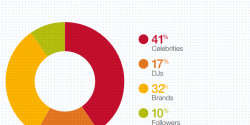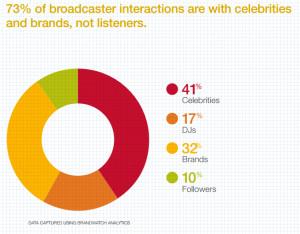A new survey by Brandwatch reconfirms earlier findings about United States radio stations and Twitter—the relationship could be a lot more dynamic, particularly for commercial music radio stations.
Here is some of the Brandwatch data:
- Only around 0.06 percent of radio listeners tweet about a US radio station. “This is 10 times less frequently than listeners in the [United Kingdom],” the study notes.
- Radio station followers are far more likely to interact with a DJ’s Twitter account than the account of the DJ’s radio station—around 54 percent more likely. The downside of this is that DJs “were also more likely to be negatively discussed.” Interestingly, most on air hosts don’t tweet much about their radio station per se. “Of all DJ’s tweets, only 5.5 percent are about radio.”
- “Radio stations are not interacting with their listeners; instead 75% of their interactions are with celebrities and brands.”
- “Tweets that mention brands receive less interaction from fans.”
- The radio stations that Brandwatch studied tweeted around seven times per week. That was much less than UK stations: on average 46 times a week.
- US radio stations tend not to tweet on the weekends: “Stations are cutting down frequency of tweets over the weekend, which doesn’t pose a problem with sleepy Sundays, but effectively [misses] out on Saturday’s popularity for audience twitter activity.”
- TV broadcasters do a lot more tweeting than radio broadcasters: “Over half (52%) of official TV show Twitter accounts engage with fans compared to just 26 percent of radio stations.”
Some of Brandwatch’s findings are very close to those of a study conducted last year by the Radio Television Digital News Association and Hofstra University.
“The use of social media is now almost universal in TV, with all categories going near or into the 90-percentile range,” the report concluded, but while “radio continues to make strides in the use of social media,” it “remains well behind television.”
Given the new Brandwatch report, I’m not sure I see a whole lot of striding. It’s not like Twitter users aren’t trying to communicate with radio stations. Earlier this year I did a search of the phrases “hey radio station” and “hey radio stations” and “hey radio” on Twitter, and got an eyeful.
Some of the tweets:
“Hey radio. There are a lot of songs other than Ho Hey and that god awful Bruno Mars song. Just sayin.”
“Hey radio, give Dustin Lynch a break. I’ve heard “Cowboys and Angels” about 17,467,500 times today.”
“Hey radio there’s more artist then just Rihanna Justin bieber and Kesha just thought I’d let you guys know”
“Hey radio can you play Diamonds by Rihanna 30 more times? Not sure I’ve heard it enough.”
PS: Don’t get the twit-o-sphere started on Rush Limbaugh. In any event, there are a lot of ways to interpret the US radio station/Twitter disconnect. One obvious motivation may be a desire on the part of commercial music radio station managers to avoid spontaneous interactions with listeners, as evinced by the typical commercial music station’s listener-free air sound.
This thesis is supported by another of the Brandwatch survey’s observations: “[N]egative tweets about a station mostly go without response from the station, possibly further embittering the unhappy listeners.” The study was based on an analytics sample of 35,000 mentions of radio stations over the summer of 2013.
Hat tip to Brad Hill of RAIN.
We cover social music sharing communities every Monday in our Internet DJ feature.




